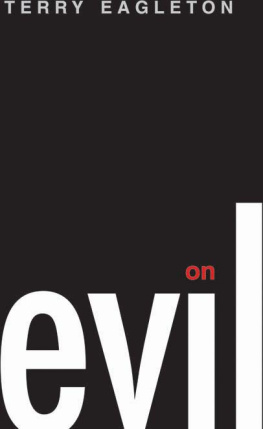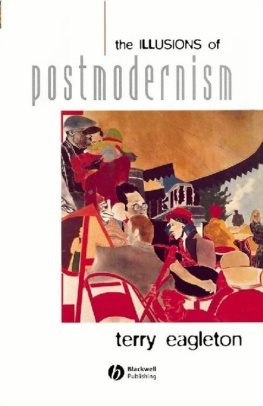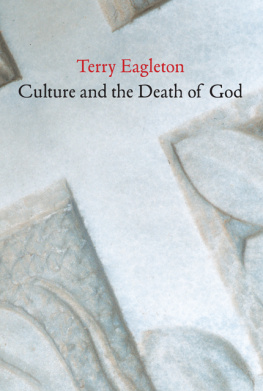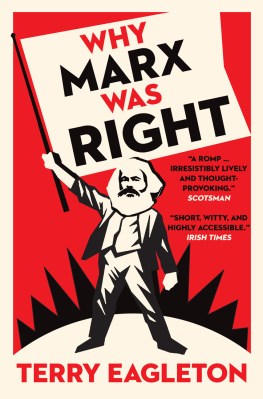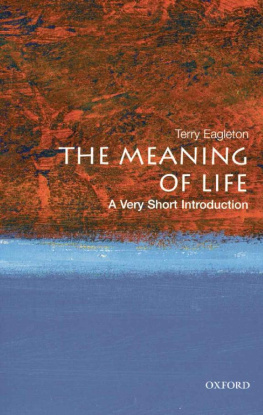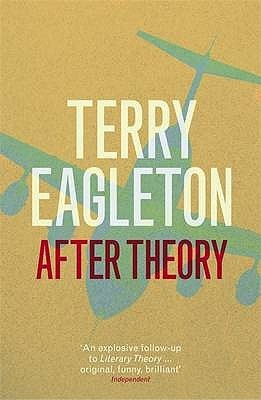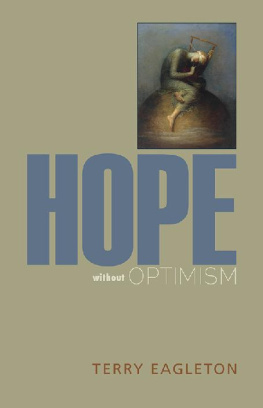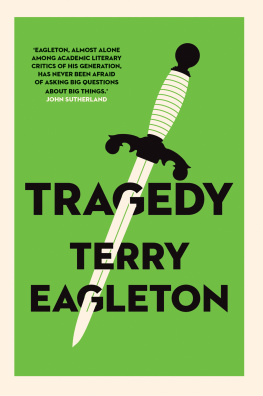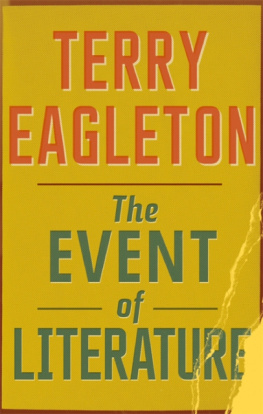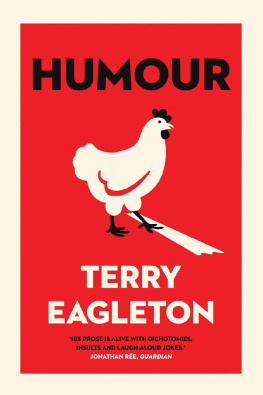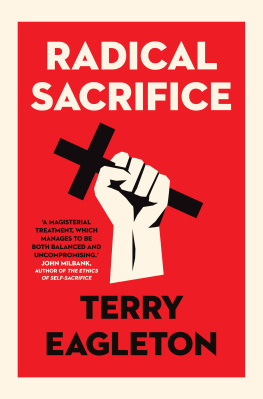On Evil
TERRY EAGLETON
On Evil
YALE UNIVERSITY PRESS
New Haven and London
Published with assistance from the foundation
established in memory of Philip Hamilton McMillan of
the Class of 1894, Yale College.
Copyright 2010 by Terry Eagleton.
All rights reserved.
This book may not be reproduced, in whole or in part,
including illustrations, in any form (beyond that copying
permitted by Sections 107 and 108 of the U.S. Copyright
Law and except by reviewers for the public press),
without written permission from the publishers.
Set in Adobe type by Keystone Typesetting, Inc.
Printed in the United States of America.
Library of Congress Cataloging-in-Publication Data
Eagleton, Terry, 1943
On evil / Terry Eagleton.
p. cm.
Includes bibliographical references and index.
ISBN 978-0-300-15106-0 (hardcover : alk. paper)
1. Good and evil. I. Title.
BJ 1401. E 23 2010
111.84dc22
2009040138
A catalogue record for this book is available
from the British Library.
This paper meets the requirements of
ANSI/NISO Z39.48-1992 (Permanence of Paper).
10 9 8 7 6 5 4 3 2 1
To Henry Kissinger
INTRODUCTION
F ifteen years ago, two ten-year-old boys tortured and killed a toddler in the north of England. There was an outcry of public horror, though why the public found this particular murder especially shocking is not entirely clear. Children, after all, are only semi-socialised creatures who can be expected to behave pretty savagely from time to time. If Freud is to be credited, they have a weaker superego or moral sense than their elders. In this sense, it is surprising that such grisly events do not occur more often. Perhaps children murder each other all the time and are simply keeping quiet about it. William Golding, an author whose work we shall be considering in a moment, seems to believe in his novel Lord of the Flies that a bunch of unsupervised schoolboys on a desert island would slaughter each other before the week was out.
Perhaps this is because we are ready to believe all kinds of sinister things about children, since they seem like a halfalien race in our midst. Since they do not work, it is not clear what they are for. They do not have sex, though perhaps they are keeping quiet about this too. They have the uncanniness of things which resemble us in some ways but not in others. It is not hard to fantasise that they are collectively conspiring against us, in the manner of John Wyndham's fable The Midwich Cuckoos. Because children are not fully part of the social game, they can be seen as innocent; but for just the same reason they can be regarded as the spawn of Satan. The Victorians swung constantly between angelic and demonic views of their offspring.
A police officer involved in the case of the murdered toddler declared that the moment he clapped eyes on one of the culprits, he knew that he was evil. This is the kind of thing that gives evil a bad name. The point of literally demonising the boy in this way was to wrong-foot the softhearted liberals. It was a preemptive strike against those who might appeal to social conditions in seeking to understand why they did what they did. And such understanding can always bring forgiveness in its wake. Calling the action evil meant that it was beyond comprehension. Evil is unintelligible. It is just a thing in itself, like boarding a crowded commuter train wearing only a giant boa constrictor. There is no context which would make it explicable.
Sherlock Holmes's great antagonist, the fiendishly evil Professor Moriarty, is presented as almost entirely without such a context. Yet it is significant that Moriarty is an Irish name, and Conan Doyle was writing at a time when there was much anxiety about revolutionary Irish Fenianism in Britain. Perhaps the Fenians reminded Doyle of his own drunken, violent Irish father, who had been locked away in a lunatic asylum. Making someone called Moriarty an image of pure evil is thus probably more explicable than it appears. Even so, evil is still often supposed to be without rhyme or reason. An English Evangelical bishop wrote in 1991 that clear signs of Satanic possession included inappropriate laughter, inexplicable knowledge, a false smile, Scottish ancestry, relatives who have been coal miners, and the habitual choice of black for dress or car colour. None of this makes sense, but then that is how it is with evil. The less sense it makes, the more evil it is. Evil has no relations to anything beyond itself, such as a cause.
In fact, the word has come to mean, among other things, without a cause. If the child killers did what they did because of boredom or bad housing or parental neglect, then (so the police officer may have feared) what they did was forced upon them by their circumstances; and it followed that they could not be punished for it as severely as he might have wished. This mistakenly implies that an action which has a cause cannot be freely undertaken. Causes in this view are forms of coercion. If our actions have causes, we are not responsible for them. I cannot be responsible for staving in your skull with a candlestick, since it was your reproving tap on my cheek that caused it. Evil, on the other hand, is thought to be uncaused, or to be its own cause. This, as we shall see, is one of its several points of resemblance with good. Apart from evil, only God is said to be the cause of himself.
There is a kind of tautology or circular argument implicit in the policeman's view. People do evil things because they are evil. Some people are evil in the way that some things are coloured indigo. They commit their evil deeds not to achieve some goal, but just because of the sort of people they are. But might this not mean that they can't help doing what they do? For the policeman, the idea of evil is an alternative to such determinism. But it seems that we have thrown out a determinism of environment only to replace it with one of character. It is now your character, not your social conditions, which drives you to unspeakable deeds. And though it is easy enough to imagine an environment being changedslums demolished, youth clubs set up, crack dealers driven outit is harder to imagine such a total transformation when it comes to the question of human character. How could I be totally transformed and still be me? Yet if I happen to be evil, only such a deep-seated change will do.
So people like the policeman are really pessimists, even though they would probably bristle at the accusation. If Satan is what you are up against, rather than adverse social conditions, evil would seem to be unbeatable. And this is depressing news for (among other people) the police. Calling the boys evil dramatises the gravity of their crime, and seeks to cut off tenderhearted appeals to social conditions. It makes the culprits harder to forgive. But it does so only at the cost of suggesting that this kind of malignant behaviour is here to stay.
If the young killers of the toddler could not help being evil, however, then the fact is that they were innocent. Most of us, to be sure, recognise that small children can no more be evil than get divorced or enter into purchase agreements. Yet there are always those who believe in bad blood or malevolent genes. If some people really are born evil, however, they are no more responsible for this condition than being born with cystic fibrosis. The condition which is supposed to damn them succeeds only in redeeming them. The same goes for regarding terrorists as psychotic, a term which the British government's top security adviser has used for them. One wonders whether this man is really up to his job. If terrorists really are mad, then they are ignorant of what they are doing and are therefore morally innocent. They should accordingly be nursed with tender care in psychiatric hospitals rather than have their genitals mutilated in secret Moroccan prisons.
Next page
